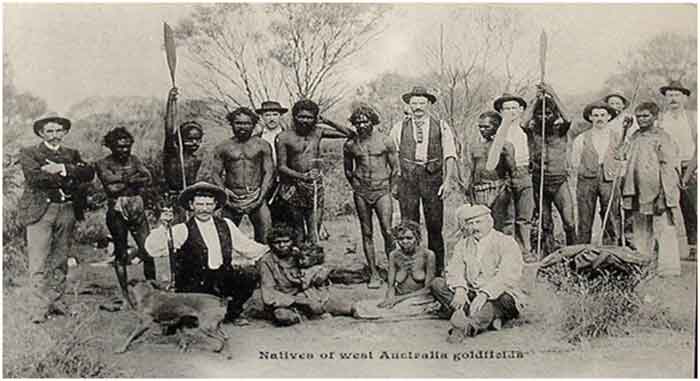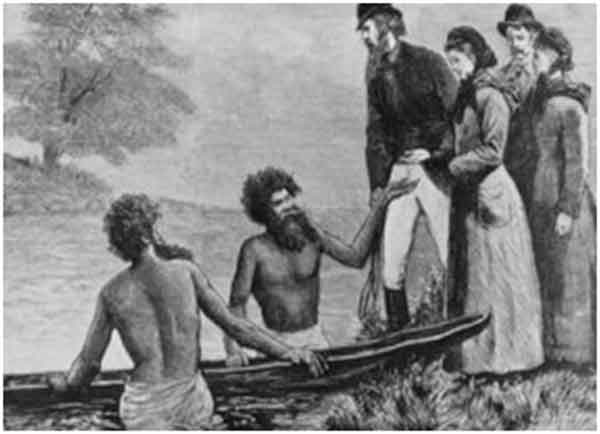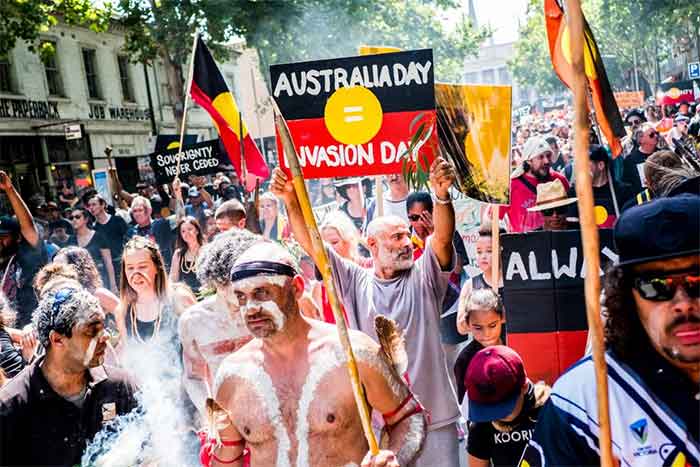
AUSTRALIAN VOTERS STILL TROUBLED BY MORAL BLINDNESS OF THE PAST
The world awaits the decision of Australia’s voters, on October 14th, of a long-time coming reconciliation with the nation’s Aboriginal peoples, Torres Strait Islanders and descendants of its non-aboriginal ‘Settler-Colonist’ forbears. It’s a complicated, contentious issue that has Australia on edge for many reasons.
But this straightforward Yes or No Vote simply asks Australian voters to add to Australia’s Commonwealth Constitution, Australia’s ultimate law, the words:
“In recognition of Aboriginal and Torres Strait Islander peoples as the First Peoples of Australia there shall be a body, to be called the Aboriginal and Torres Strait Islander Voice. The Aboriginal and Torres Strait Islander Voice may make representations to the Parliament and the Executive Government of the Commonwealth on matters relating to Aboriginal and Torres Strait Islander peoples.”
IT’S TIME TO ONCE AND FOR ALL OVERCOME ITS HISTORIC ‘WHITES ONLY’ HERITAGE
Historically, Australia’s White Policy intentionally favoured immigration to Australia from other English-speaking or white European countries. The term implies that, in the case of indigenous non-white aboriginal peoples, they were kept isolated and ignored as much as possible.
The term encapsulated a set of racial and racist policies that from the 1850’s onward sought to forbid peoples of non-European ethnic origins – especially Asians (primarily Chinese) and Pacific Islanders from immigrating to Australia, that also looked negatively upon immigrants from Italy.
These policies were progressively dismantled between 1949 and 1973. But from the 1850’s to the Federation of Australia in 1901, the federal government under Edmund Barton, and guided by Alfred Deakin, who became Australia’s second Prime Minister, pushed through the Immigration Restrictions of 1901 which officially marked the commencement of the White Australia Policy that continued to be strengthened right up to the start of WWII.
Even throughout WWII, Australia’s Prime Minister John Curtin sought to reinforce the policy, saying “this country shall remain the home of the descendants of those people who came here in peace in order to establish in the South Seas an outpost of the British race.” The goal was to create an Anglo-Celtic ideal society that, in effect, excluded indigenous Australian aboriginals.
The National Museum of Australia describes the White Australian Policy as being “openly racist, that existed because many White Australians feared non-white indigenous and immigrant peoples would threaten Australian society.
But, of course, we’re not talking about ancient history. This is modern-day history that, collectively, is within the living memory of many colonial and indigenous peoples in Australia that still can only but impact upon any vote that calls for a special kind of ‘Voice’ in the Australian Parliament, in this case for aboriginal peoples. “You’re dreaming”, as Aussies might say, to ever think, given the track record of Corporate Australia, that’s part of an intricate spider web of corporate interests everywhere in the world, to hope such interests will ever allow a traditional aboriginal voice in Australia’s Parliament.
AUSTRALIAN VOTERS CRITICALLY-IMPORTANT OCT. 14TH COMPULSORY VOTE TO SAY YES/NO
The results of the October 14th Vote will go a long, long way towards Australians creating new government policies that will say both to themselves and to the world the extent and degree to which they’re willing to acknowledge the great significance of the ancient practices and traditional knowledge of is First Nation peoples, and what it means to acknowledge the meaning of ‘Country’ in terms of human life and that of the business interests of every nation.
White Australia policy – Wikipedia
WHERE WILL THE VOICE OF INDIGENOUS ABORIGINAL PEOPLES FIT INTO THESE NEW POLICIES
But, of course, old cultural patterns always die hard. The old policies of White Australia were slowly dismantled in stages with the end of WWII, with Prime Minister Menzies and PM Holt’s governments (1949-1967) gradually opening up Australia to non-British Europeans to immigrate to Australia until Prime Minister Gough Whitlam’s government, only fifty years ago, finally passed laws to ensure that race would be totally disregarded as a component for immigration with the passage, in 1973, of the Racial Discrimination Act.
WHERE DOES THAT PUT AUSTRALIAN VOTERS ON THE EVE OF THE OCTOBER 14TH VOTE
For the past six years, Ron Morgan Research has been investigating consumers’ use and views of web browsers and search engines, while asking more than 2,000 Australian’s every month questions pertaining to a number of important Australian issues, among which are what brands, products and companies the people trust or distrust the most.
The results have shown that Australians have never been more distrusting of Corporate Australia than they are in 2023. Their research has revealed that, since the onset of COVID, Australians are angry and distrustful of, among many things, companies like PwC, Optus, Telstra, Medibank, Facebook, Meta, Harvey Norman, since its ‘Job Keeper Scandal’, and even Quantas Airlines has fallen from one of the countries most trusted brands to one of its most distrusted. But especially the monster mining enterprise Rio Tinto ever since its wilful, malicious destruction, in 2020 in Western Australia, of the world-famous Juunkan Gorge’s Aboriginal World Heritage site. In a matter of minutes, this 40,000 year-old precious shelf of seminal Aboriginal rock art, that was meant as a gift to all of humanity throughout all time, was blasted into smithereens, just so Rio Tinto’s mining executives could access a mere $135 million dollars worth of more iron ore.
Which brings the tensions front and centre to 2023, and the vote on October 14th; of one of Australia’s most contentious referendums ever held between its First Nation Aboriginal peoples, Torres Strait Islanders and the descendants of Australia’s early settler colonist peoples.
Voters are distressed by the ‘moral blindness’ of corporate Australia, says Roy Morgan – ABC News
WHAT THE YES VERSUS NO VOICE IN PARLIAMENT ARE SAYING
A simple ‘Yes’ or ‘No’ referendum is to be held on whether or not the inherent rights of the original Aboriginal people, and Torres Strait Islanders, after over two centuries of being muzzled, finally deserves to have ‘A Voice in Parliament’; ‘Their own Special Singular Voice’, in Australia’s Parliament.
But Yes and No campaigns, drafted by parliamentarians on both sides of this divisive question, have since established blistering yay or nay arguments that since have been published on the Australian Electorate Commission’s website.
Australian Electoral Commission (aec.gov.au)
What follows is this writer’s take on this all-important vote, as one of Irish descent, who has been married to an Aussie for nearly five decades, who has lived in, and still passionately loves, that dry, brown land, its peoples and ancient, ever-evolving heritage, who now seeks to make some sense of all the latest political twists and turns.
Whatever voter pamphlet or pamphlets are yet be distributed or posted, hopefully, they will shed more light on some of the ‘facts’, about which this writer so far has only begun to discern.
Some critics of the referendum process contend the vote is flawed for two reasons. First of all, apparently, by the fact that the Australian Labor Government, who currently holds power, hasn’t yet distributed to the electorate voter a pamphlet or pamphlets strictly based upon just the ‘Facts’ the vote is to be based upon.
For instance, what the legalization, if codified, this vote will henceforth mean to both Aboriginal and Torres Strait Islanders, as well as every other non-aboriginal Australian on whatever decisions they, collectively, will decide together. Secondly, that the ‘Yes’ or ‘No’ positions should be published in entirely separate, unedited and unformatted documents, exactly as they have been received by those arguing both sides of the issue. Thirdly, regarding the ‘No’ Vote on a Voice in Parliament, there must be a clearly stated clarification of claims that have been made about the nation’s National Indigenous Australian’s Agency, as well as a clearer definition of what any future treaty made between aboriginal and non-aboriginal peoples would mean, and whether or not a constitutional convention must or will precede any constitutional changes yet to be made.
WHAT THIS CONSTITUTIONAL RECOGNITION MEANS TO OBSERVORS OVERSEAS
Other nations, with similar settler-colonial-aboriginal histories, like Canada, New Zealand and the United States, who formally recognized their own First Nations decades ago, will be keenly interested in the outcome of the facts as they evolve.
FACT – In 2017, the then Shadow Minister for Indigenous Australians, Linda Burney, accurately stated, that the Australian Constitution is the only constitution of a First World Nation with a colonial history that does not recognize its first peoples.”
The Canadian Constitution was altered to specifically name the “aboriginal peoples of Canada – the Indian, Inuit and Metis people -, while affixing their existing treaty rights and guarantees that the rights and freedoms shall not be construed so as to abrogate or remove from any treaty whatever inherent rights or freedoms pertain to the aboriginal peoples of Canada.
Furthermore, that any changes yet to be made to relevant sections of Canada’s constitution would have to be made in consultation with representatives of their aboriginal peoples.
FACT – Though New Zealand has no single constitution itself naming its aboriginal peoples per se, it is considered to be a constitutional monarchy which has “constitutional practices” that recognize its Maori people, made in the Treaty of Waitangi in 1840, between the British and various Maori chiefs.
FACT – In the United States, aboriginal people are referred to in the U.S. Constitution, since 1789, for the purpose of trade and commerce, which legal experts agree is a formal de facto recognition of their rights. Though the U.S. Constitution only mentions ‘Indian Tribes’, as it empowers the Federal Government to regulate commerce with them, legal experts agree it establishes the importance of its aboriginal peoples and their central place in what became the USA.
A VOICE IN PARLIAMENT IS STEP ONE TOWARDS FUTURE TREATY’S & TRUTH-TELLING
FACT – Treaties between Settler-Colonial Governments and Aboriginal Peoples in the New World already have been successfully negotiated elsewhere. In Canada, for example, the government has signed 26 such treaties since 1975 (and another 70 between 1701 and 1923)
FACT – The ‘No’ Vote argument, as it’s presented, incorrectly suggests that any treaty between Aboriginal peoples and the Australian Government would be “merely an agreement between one group of Australian citizens and the Government.”
FACT –Given that the Australian Government already is a signatory to the UN Declaration of the Rights of Indigenous Peoples, the Australian Government already has essentially recognized that “Indigenous Australians are simultaneously members of their own nation, and the Australian Nation.” This dual recognition is key to any future Indigenous-State Treaty entered into by all parties, that ‘No’ voter’s discount. Consistent with the UN Declaration, a treaty can be made, say, between Australia’s Wurundjeri people and the State of Victoria, with the Wurundjeri represented by their own governance body.
FACT – By extension, the same treaty negotiation process between Australia’s State government with their First Nation peoples could be negotiated throughout the entire nation’s other states.
NATIONAL INDIGENOUS AUSTRALIANS AGENCY (NIAA)
FACT- The ‘No’ Vote attempts to discredit the ‘Yes’ Vote by arguing there already exists hundreds of indigenous bodies at all levels of government, such as the NIAA, with its bloated 1400 member staff, as just one more example of adding yet another level of bureaucracy to the problem and not the ultimate answer.
FACT – The NIAA is staffed by public servants with the Departments of the Prime Minister and his Cabinet, and not an independent body in the same way that A Voice To Parliament’ would be.
FACT – The NIAA is not an entirely indigenous organization, with only something like a mere 22% of the staff identified as Aboriginal and/or Torres Strait Islanders.
CLOSING THE GAP
FACT – The ‘Yes’ Voice in Parliament seeks to argue for the need to severely ’close the gap’ between Australia’s Aboriginal peoples and the descendants of its Settler-Colonial’ peoples
FACT- Aboriginal and Torres Strait Islanders have a life expectancy 8 years shorter than non-indigenous Australians; a worse rate of disease, infant mortality, and; a suicide rated twice as high as it is for non-indigenous Australians
FACT- Within the 19 socio-economic targets of Australia’s National Agreement on Closing the Gap, designed to measure progress in life outcomes for Aboriginal and Torres Strait Islanders, aren’t to be found among the four targets on track to be met by the government.
1967 REFERUNDUM
FACT – A constitutionally-enshrined ‘Voice to Parliament’ would unite Australians, 90% of whom, in 1967, already voted ‘Yes’ to change the constitution so that Aboriginal and Torres Straits Islander people would be counted in the population in the same way as everyone else.
FACT- The ‘Yes Vote to a unique ‘aboriginal voice’ in its Parliament’ proposes to remove from the Australian Constitution the words that declare Parliament shall have the power to make laws for the peace, order and good government of the Commonwealth with regard to the people of any race, including its aboriginal peoples without due recognition, or that prohibits Australia’s Commonwealth government from excluding First Nation Australia from the official population count.
FACT – The ‘No’ Vote for a Voice in Parliament falsely claims the current referendum has received less scrutiny than other previous attempts to change the constitution. Yet the ‘Yes’ Vote clearly points out that the intense scrutiny that preceded the 2017 First Nations National Convention produced The Uluru Statement from the Heart, that called for a constitutionally-enshrined Voice to Parliament.
Home – Uluru Statement from the Heart
These are but a few of the facts that should be considered in deciding whether or not a ‘Yes’ or a ‘No’ vote will be paramount in this all-important referendum. The future of Australia and a great deal more in the world hangs in the balance. There is so much more to what all is entailed in the vote. Let world opinion now weigh into the outcome.
Voice to Parliament: Here are the key arguments for the Yes and No campaigns | SBS News
The cases for and against aisn Aboriginal and Torres Strait Islander Voice – ABC News
EPILOGUE
As one of Irish descent, this writer’s own ancestors were long ago dispossessed of their once sacred aboriginal homelands in the Old World, much in the same way, by the same ones who dispossessed Australia’s Aboriginal and Torres Strait Islanders of their sacred lands in the New World. His grandfathers, grandmothers and kin were also forcibly-evicted from their ancestral lands and forced to flee to the New World. The cargo manifest of the ships that transported them, indeed read “Vagrants”. While his Great, Great, Great Grandmother Bridget, before she could be evicted, suffering from extreme malnutrition due to a lack of food, other than the common grasses that lay underfoot, seeking some basic warmth, fell into the hearth and was nearly burnt alive before anyone outside, themselves seeking some meagre refreshment in the sun, noticed the smell of her burning flesh. Thus, these writings are written in her and their honor, as well, and what the writer wished someone like himself, in some long, long ago distant time, would have also attempted to give them a stronger voice in a world that day by day, month by month, year by year, drifts further and further away from the basic human relationships with our Mother Earth and one another. It’s to their spirit and honor, that these words are also nevertheless offered.
Jerome Irwin is a Canadian-American writer who, in previous lives, has been involved in a wide range of diverse and varied worlds, including the Criminology profession with an American police department, and later for a brief-time in the capacity of clandestine communications with the U.S. Central Intelligence Agency. For decades, in various other professional capacities as an educator, researcher, geo-political analyst, and writer. Irwin has sought to call attention to a broad spectrum of world problems pertaining to the degradation and unsustainability caused by a host of environmental-ecological-spiritual-ideological issues that exist between the conflicting world philosophies of indigenous and non-indigenous peoples.
Irwin is the author of the book, “The Wild Gentle Ones; A Turtle Island Odyssey” (www.turtle-island-odyssey.com), a spiritual odyssey among the native peoples of North America that over the decades has produced numerous articles pertaining to: Ireland’s Fenian Movement; native peoples Dakota Access Pipeline Resistance Movement; AIPAC, Israel & the U.S. Congress anti-BDS Movement; the historic Battle for Palestine & Siege of Gaza, as well as; the many violations constantly being waged by industrial-corporate-military-propaganda interests against the World’s Collective Soul. To examine a portion of the eclectic body of his work goggle: “Jerome Irwin, writer” The author and his wife are long-time residents on the North Shore of British Columbia.












































